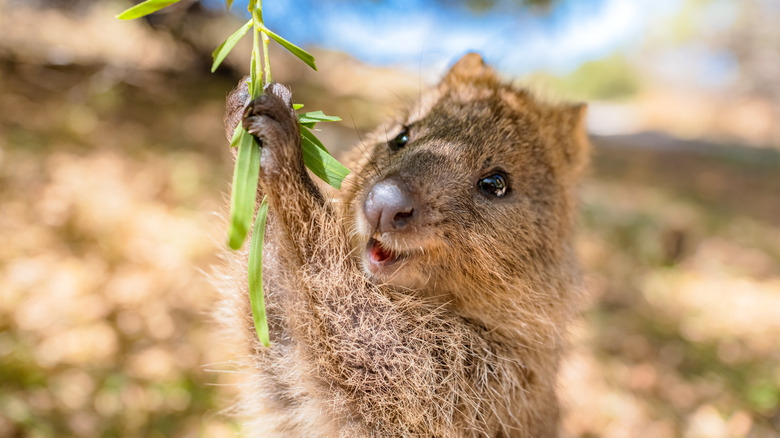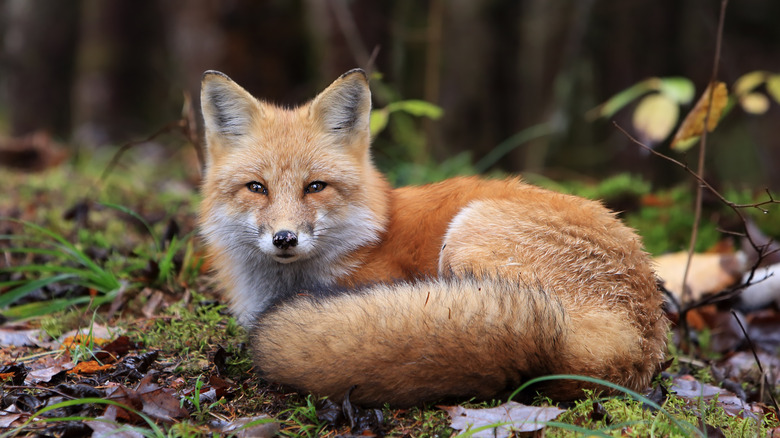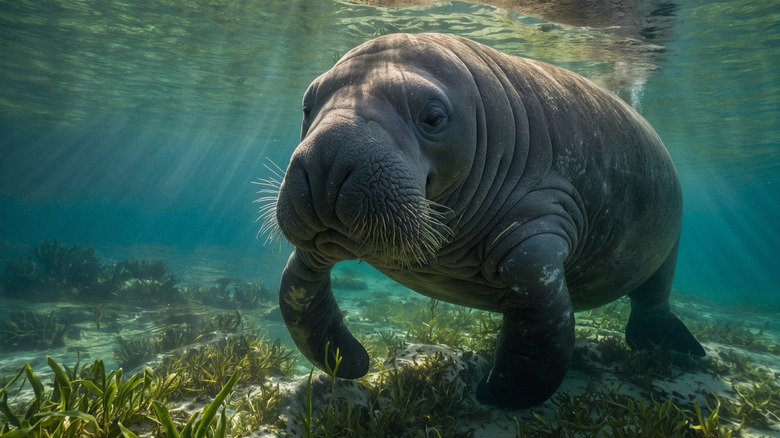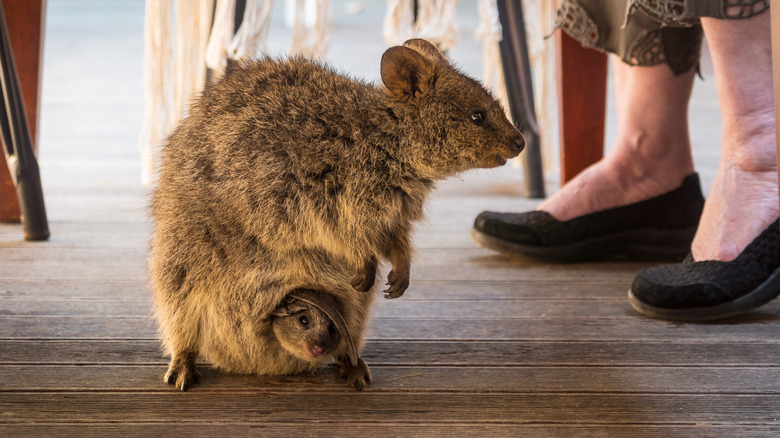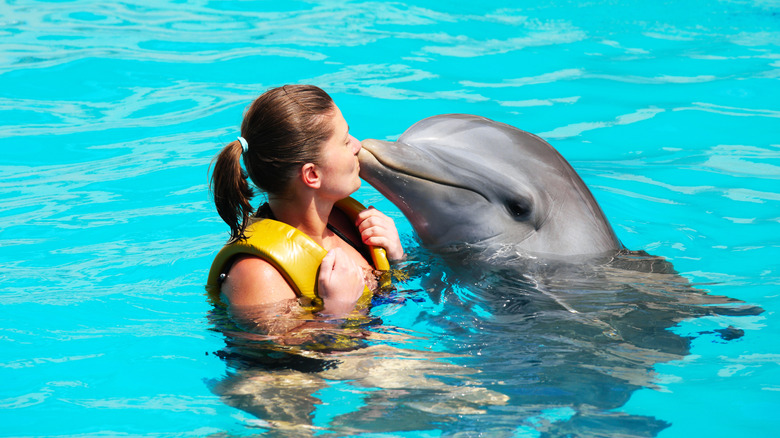The Friendliest Wild Animals That Love Humans
When it comes to affectionate and friendly animals, most people opt for cats or dogs, but there are others who take a more interesting route, choosing rodents, birds, reptiles, or fish. Signs that a dog loves its owner or a cat wants cuddles are easy for pet parents to interpret, and there's a certain comfort in those strong bonds. This desire to create lasting and memorable moments with pets can extend to the broader animal kingdom, too. Who doesn't want to hug a red panda? That said, most wild animals are just that — wild — and it's essential that people respect nature's adorable creations and don't attempt to treat them like pets.
Still, this rule has some exceptions, with some wildlife being more prone to forming bonds with humans than others. These affectionate animals often have strong social structures and are willing to approach other species; there's no shortage of people sharing remarkable stories of unique interactions online. Just remember: As cute and potentially cuddly as these creatures are, you should never approach one without concerns about safety and potential threats. Affection is possible but never guaranteed.
Foxes can be as kind to humans as they are clever
It's difficult not to compare foxes to the cutest small dog breeds, as they share many physical characteristics; both belong to the canid family, although foxes are classified as vulpines. Dogs and foxes split from a shared ancestor around 10 million years ago. Their similarities include an omnivorous diet and a strong sense of hearing and smell for hunting. Some people perceive them as clever, playful, and emotional animals like dogs, and breeds like the Saharan fennec fox have become somewhat popular to own as a pet.
@juniperfoxx The queen has spoken
Foxes aren't the same as their domesticated canine friends, but one famous online celebrity has shown that some vulpines can be very affectionate to people: Juniper. Living in the non-profit sanctuary named after him, the Juniper Wildlife Refuge, the adorable Juniper resides alongside several other wild animals needing shelter, including another fox companion. On Instagram and TikTok, Juniper has demonstrated the potentially affectionate nature of a wild fox. Whether through begging for attention or playing with other animals, Juniper has become a spokesperson for animals in need and has charmed many with his antics.
Manatees are docile and kind to people
Often called a "sea cow" due to its docile nature, the manatee lives a pretty relaxed life, balancing sleep, grazing the ocean or freshwater lake floor, and traveling. As an herbivore, the large mammal doesn't have the same types of teeth or intent to bite as other marine life. Moreover, the gentle giant is naturally more curious than wary of humans, which has led to many boaters and swimmers having positive interactions with one.
@merladyjazz Have you every encountered a manatee? 🥺🥰 #manatee #florida #swim #wildlife #cuteanimals #givethanksnotpranks #gettheretogether #puppiesonly
The best place for people to see and potentially interact with manatees in the U.S. is within the warm waters of Florida, where the West Indian manatee is native. A survey completed throughout 2021 and 2022 by the Florida Fish and Wildlife Conservation Commission gave an estimated population between 8,350 and 11,730 across both coasts of Florida. They're not an uncommon sight for those visiting the region.
Despite the many online videos that show interactions with the seafaring giants and the healthy population, touching and feeding Manatees is prohibited by law and can result in fees of $500 from the state or 60 days in prison. Anyone caught hunting or purposely disturbing their environment can face harsher fines under federal law. Still, manatees' calm nature and kind curiosity show how much love they have to give.
The quokka has earned the title of the world's happiest animal
Quokkas have become a tourist highlight for regions like Rottnest and Bald Island in Western Australia. This popularity is due to their adorable smiles and naturally curious nature; the Australian island representative has earned a reputation as "the happiest animal on Earth," per WWF-Australia. The quokka belongs to the same family as wallabies and kangaroos (Macropodidae), which gives it an adorable hop. Unlike its kangaroo cousins, the quokka isn't territorial and is comfortable coexisting with others and the region's locals.
Quokkas tend to get up close and personal with people, as the species doesn't have a long history of being hunted by humans or many other animal species. Rottnest Island has a human population of around 300, but more than half a million tourists come through annually, always giving the naturally curious cutie's new friends to meet and follow around the island. Getting Instagram-worthy pictures and videos with a Quokka has become a must for many visitors to the region.
@tessgoestravelling Quokkas !!!! Ahhhh they are the cutest animal ive ever seen! We saw so so many! Flying to Perth was definitely worth it! 😍😍😍🙌🏻🙌🏻🩷🙌🏻🙌🏻🙌🏻 #rottnestisland #perth #australia
While the quokka is undoubtedly adorable, it's currently labeled as vulnerable on the International Union for Conservation of Nature Red List. As much as a visitor may want to cuddle or feed a Quokka, the animal's protected status makes it illegal to feed or touch one. Instead, the Rottnest Foundation allows visitors or admirers to adopt quokkas online. This adoptive gesture is the best way to give the quokka some love and ensure its safety so that it can keep being an ambassador for Australia's unique fauna.
Dolphins have a history of saving humans in trouble
Swimming with dolphins has become a bucket-list goal for many, with the sea mammal's social, intelligent, and kind nature making for a highly sought-after bonding opportunity. Yet, a dolphin's affection for people goes beyond a swim alongside them, as there are multiple stories of dolphins saving people from drowning or guiding them to safety. For the social dolphin, saving people may be tied to its understanding of being alone as being susceptible to the dangers of the ocean. Alternatively, areas where people are known to feed dolphins have potentially created a reciprocal kindness.
@dolphindiscovery Nadar con Delfines es como un sueño hecho realidad🩵🐬✨ #dolphindiscovery #nadocondelfines #delfinesencancun
While wild animals' love for people can't be topped by that of the dolphin, which has saved many lives, approaching one in its natural habitat can be fatal for the remarkable sea mammal. Becoming overly familiar or dependent on people can cause them to enter dangerous areas where they can get hit by a boat propeller or caught in fishing lines. Dolphins can also be under stress, with the recent heartbreaking cases of dolphins and sea lions attacking humans on the California coast a reminder of the unpredictability of wild animals when faced with current threats brought on by human interference.
Swimming with the dolphins may be a dream of many, meeting a happy quokka is an "aww"-inducing interaction, foxes remind people of the beloved dog, and manatees are giant softies who are comfortable around people. Yet, all these animals remain wild, and interactions with them can be dangerous and detrimental to their respective environments. It's as important to respect nature as it is to fall in love with all of its adorable animals that have learned to appreciate humans in their own ways.
